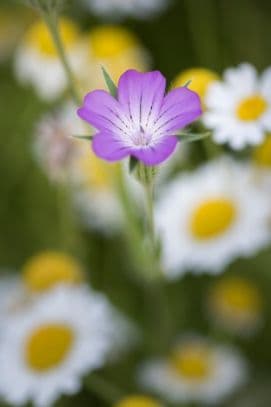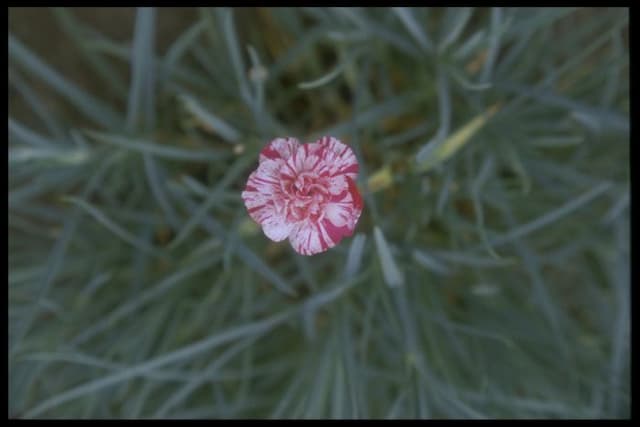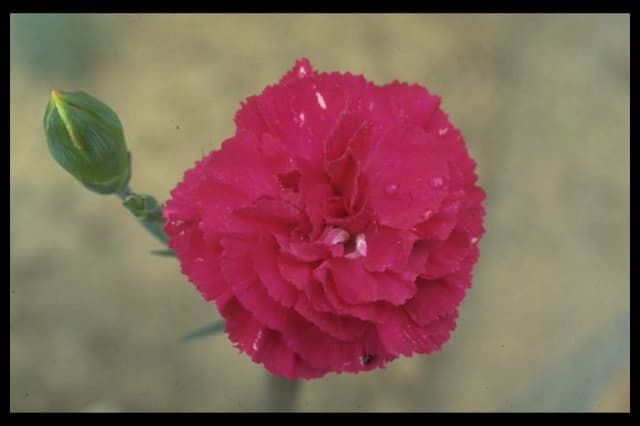Dianthus Cherry Daiquiri Dianthus (Allwoodii Group) Cherry Daiquiri = 'Wp15 Pie42' (PBR) (Cocktails Series) (p)
![pink [Cherry Daiquiri]](/_next/image?url=https%3A%2F%2Fplants-admin.emdemapps.com%2Fimages%2Fplants%2F%2Fimages%2F604b53704a83a.png&w=3840&q=75)
ABOUT
The Dianthus Cherry Daiquiri is a vibrant and eye-catching plant known for its striking flowers and lush foliage. The flowers are a standout feature of this variety, with their rich, cherry-red hue that resonates with an almost velvety appearance. The petals often have a finely serrated or fringed edge, adding to their intricate beauty and giving them a somewhat ruffled look that is highly decorative. This fringing is a hallmark of many Dianthus varieties, offering a delightful texture. The blooms of the Dianthus Cherry Daiquiri typically have a distinctively spicy, clove-like fragrance that can be quite potent and pleasing to the senses. This alluring aroma often draws garden visitors closer to appreciate both the scent and the stunning visual appeal of the flowers. The plant produces an abundant number of these fragrant blossoms which can cover the plant in a blanket of color during its peak blooming period. The foliage of the Dianthus Cherry Daiquiri is also notable, with slender, linear leaves that are a striking blue-green color. These leaves form a dense mat-like ground cover, which serves as an attractive backdrop to the vivid flowers. The contrast of the deep red petals against the bluish-green leaves makes the colors pop and further accentuates the aesthetics of this charming plant. Overall, the Dianthus Cherry Daiquiri presents a cheerful and colorful aspect to any garden setting. Its striking flowers, delightful fragrance, and attractive foliage make it a prized addition for gardeners looking to add a splash of color and sensory pleasure to their landscape.
About this plant
 Names
NamesFamily
Caryophyllaceae
Synonyms
Cherry Daiquiri Dianthus, Cherry Daiquiri Pinks
Common names
Dianthus 'Wp15 Pie42', Dianthus Cherry Daiquiri 'Wp15 Pie42'.
 Toxicity
ToxicityTo humans
The plant commonly known as Dianthus is generally not considered toxic to humans. There are no significant toxic effects expected from the ingestion of small quantities of Dianthus. However, consuming large amounts of any plant material may cause mild stomach upset due to the unusual dietary content. It is always advisable to avoid ingesting plants that are not specifically grown or identified as food crops.
To pets
Dianthus is not typically toxic to pets such as dogs and cats. There is minimal risk of poisoning from this plant if pets happen to ingest small amounts. While it is not particularly harmful, it is still optimal to prevent pets from consuming non-food plants as they might cause mild gastrointestinal upset or an allergic reaction in more sensitive individuals.
 Characteristics
CharacteristicsLife cycle
Perennials
Foliage type
Evergreen
Color of leaves
Green
Flower color
Pink
Height
1 foot 0-2 inches (30-60 cm)
Spread
1 foot 0-2 inches (30-60 cm)
Plant type
Herb
Hardiness zones
5
Native area
Europe
Benefits
 General Benefits
General Benefits- Aesthetic Appeal: The Dianthus Cherry Daiquiri has vibrant pink blossoms that add a splash of color to gardens.
- Long Blooming: Known for its prolonged blooming period which offers visual interest throughout the growing season.
- Attracts Pollinators: This plant's flowers attract beneficial pollinators like bees and butterflies to the garden.
- Easy Care: Dianthus is relatively low maintenance, making it suitable for gardeners of all skill levels.
- Drought Tolerance: Once established, these plants are fairly drought-tolerant, reducing the need for frequent watering.
- Fragrance: The flowers of the Dianthus Cherry Daiquiri emit a pleasant scent that can enhance the sensory experience of a garden space.
- Compact Size: Its compact growth habit makes it ideal for small gardens, borders, and containers.
- Deer Resistance: The plant is somewhat resistant to deer, which makes it a good choice for gardens in areas with high deer populations.
- Seasonal Interest: In addition to flowers, some varieties of Dianthus produce attractive seed heads that add interest in the fall and winter.
- Versatile: This plant can be used in various garden designs, including rock gardens, cottage gardens, and formal bedding schemes.
 Medical Properties
Medical PropertiesThis plant is not used for medical purposes.
 Air-purifying Qualities
Air-purifying QualitiesThis plant is not specifically known for air purifying qualities.
 Other Uses
Other Uses- Artistic inspiration: The vibrant colors of Dianthus can serve as a muse for artists and designers, influencing their work with its striking hues.
- Natural dye: Petals of Dianthus can be used to create natural dyes for fabrics, offering a sustainable alternative to chemical dyes.
- Greeting cards decoration: Dried Dianthus flowers can be pressed and used to embellish greeting cards or bookmarks for a touch of natural beauty.
- Plant photography: The distinct appearance of Dianthus makes it a favorite subject for photographers, especially those specializing in botanical imagery.
- Scented sachets: Dried Dianthus petals can be placed in small pouches to create natural scented sachets for drawers and wardrobes.
- Culinary garnish: The edible petals of Dianthus can be used to add a splash of color and subtle flavor to salads and desserts.
- Fragrance enhancement in potpourris: Dried Dianthus petals can be included in potpourri mixes for their lovely fragrance and color.
- Floral crafts: Dianthus flowers can be incorporated into floral crafts, such as wreaths or arrangements, adding a unique texture and color blend.
- Educational resource: The growth and care of Dianthus plants can be used as a teaching tool for horticulture students, demonstrating plant propagation and maintenance.
- Wedding décor: Dianthus flowers are often used in wedding bouquets and centerpieces, providing a romantic and whimsical touch.
Interesting Facts
 Feng Shui
Feng ShuiThe plant Carnation is not used in Feng Shui practice.
 Zodiac Sign Compitability
Zodiac Sign CompitabilityThe plant Carnation is not used in astrology practice.
 Plant Symbolism
Plant Symbolism- Divine Love: Dianthus has a name that originates from the Greek words “dios” (divine) and “anthos” (flower), symbolizing the concept of divine love or the love of the gods.
- Passion: The bright and bold colors of Cherry Daiquiri Dianthus, including reds and pinks, commonly represent deep emotional bonds and passionate feelings.
- Boldness: With its striking and vivid appearance, Dianthus often symbolizes boldness and the ability to stand out from the crowd.
- Purity: Historically, dianthus flowers, which also include carnations, are associated with purity and innocence due to their simple yet elegant form.
- Admiration: A bouquet of Dianthus can imply admiration for someone’s passion, energy, or unique qualities, making it a flower given to show respect and high esteem.
- Lasting Affection: Thanks to their long-lasting blooms, they are often associated with the idea of enduring love or affection that stands the test of time.
- Gratitude: The Dianthus may also signify gratitude, making it an appropriate gift to show appreciation for someone’s help or friendship.
 Water
WaterPinks should be watered thoroughly whenever the top inch of soil feels dry to the touch, which could vary from once a week to every few days, depending on climate conditions. They require a deep watering to ensure moisture reaches the roots, but it's crucial to allow the soil to dry out between waterings to prevent root rot. Generally, during the active growing season in spring and summer, pinks may need more frequent watering, especially in warmer, drier climates. In cooler weather or when the plant is not actively growing, reduce the frequency. As a guideline, provide approximately one gallon of water per plant every week during the growing season, adjusting based on rainfall and temperature.
 Light
LightPinks flourish best in full sun, which means they should receive at least six hours of direct sunlight every day. The ideal spot for them is in an area that gets unfiltered sunlight for most of the day, as this promotes robust growth and optimal flowering. They can tolerate light shade, especially in very hot climates, but too much shade can lead to weak stems and sparse blooms.
 Temperature
TemperaturePinks are quite cold-hardy and can tolerate temperatures down to about 20°F without protection, which means they can survive light frosts. The ideal temperature range for growing pinks is between 60°F and 70°F. Although they can handle heat, in very hot summer climates, they benefit from some afternoon shade to prevent heat stress.
 Pruning
PruningPruning pinks is important to promote bushy growth and to remove spent flowers, which encourages further blooming. Deadheading, or cutting off the faded blossoms, should be done regularly throughout the blooming season. The best time for more extensive pruning to shape the plant or remove woody stems is in early spring, before new growth starts.
 Cleaning
CleaningAs needed
 Soil
SoilThe best soil mix for the Pinks (a common name for Dianthus) should be well-draining with a slight alkaline pH between 6.7 and 7.3. Mix equal parts of loam, sand, and peat for optimal drainage and nutrients.
 Repotting
RepottingPinks (Dianthus) do not require frequent repotting and it is generally recommended to do so every 2-3 years or when they outgrow their current container.
 Humidity & Misting
Humidity & MistingPinks (Dianthus) prefer moderate humidity levels but are quite adaptable and can tolerate a range of humidity conditions as long as they have good air circulation.
 Suitable locations
Suitable locationsIndoor
Place in bright light and ensure good air flow.
Outdoor
Full sun, well-draining soil, protect from heavy rains.
Hardiness zone
5-9 USDA
 Life cycle
Life cycleDianthus Cherry Daiquiri, part of the Cocktails Series, begins its life as a seed that germinates in favorable conditions of warmth and light, usually in spring. Once sprouted, the seedling grows into a young plant with characteristic narrow leaves and starts to develop a robust root system. The vegetative stage continues with the development of dense tufts of foliage, and as the plant matures, flower buds form at the tips of the stalks. Flowering occurs typically from late spring to early summer, where the plant displays its vibrant pink flowers that attract pollinators for sexual reproduction. After pollination, seeds develop and are distributed from the spent flowers, completing the plant's reproductive cycle. The plant may continue to thrive for several years, often grown as a perennial, with regular blooming cycles each year if provided with proper care and conditions.
 Propogation
PropogationPropogation time
Spring-Early Summer
Propogation: The most popular method for propagating Dianthus 'Cherry Daiquiri' is through cuttings. The best time to take cuttings for propagation is in late spring or early summer when the plant is actively growing. To do this, you would take a sharp, clean pair of scissors or pruning shears and cut a 3- to 5-inch (8-13 cm) long stem section just below a node, ensuring there are at least two to three sets of leaves on the cutting. The lower leaves are then removed, and the cut end can be dipped in rooting hormone to encourage root development. The cutting should then be planted in a well-draining soil mix and kept moist, not soggy, until roots have developed, which usually takes 2 to 4 weeks. Once rooted, the young plants can be transplanted to their final location.


![Pink [Passion]](/_next/image?url=https%3A%2F%2Fplants-admin.emdemapps.com%2Fimages%2Fplants%2F%2Fimages%2F604b53b9b9334.png&w=640&q=75)

![Pink [Silver Star]](/_next/image?url=https%3A%2F%2Fplants-admin.emdemapps.com%2Fimages%2Fplants%2F%2Fimages%2F604b61705f0a1.png&w=640&q=75)




